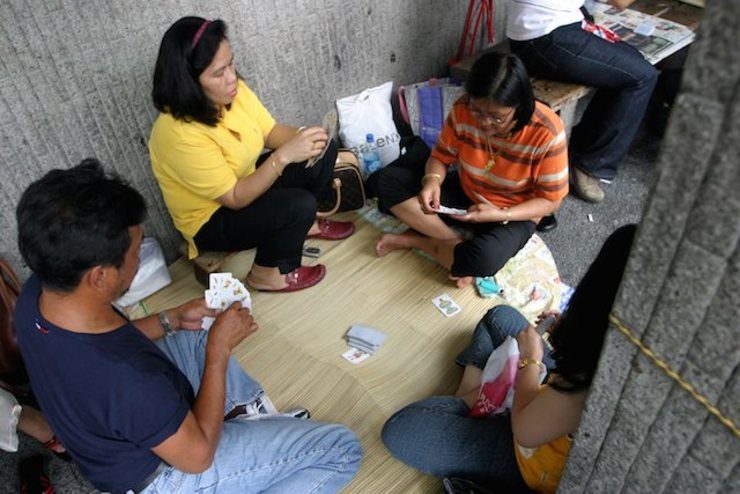SUMMARY
This is AI generated summarization, which may have errors. For context, always refer to the full article.

HONG KONG – For years, hundreds of thousands of Filipino workers have had to pay through their teeth to secure jobs as domestic workers abroad.
The practice has gotten so commonplace that when told that the government has a no-placement fee policy for those deployed to work abroad as domestic helpers (maids, household service workers, or whatever term has been coined to describe the job), the immediate reaction has always been, “Don’t pull my leg!”
But a recent ruling by the Philippine Overseas Employment Administration does say in plain words that it is true, that Filipinos who go abroad for domestic work are not supposed to pay a single centavo.
The decision, issued on August 4 and signed by POEA Administrator Hans Cacdac, ordered the preventive suspension of Findstaff Manpower Resources, Inc and its Hong Kong counterpart, Satisfactory Employment and Travel Services Ltd.
Both agencies were held liable for the collection of HK$21,000 (P115,000) from 10 Filipino workers they deployed to Hong Kong, who later filed a complaint with the POEA.
Cacdac also ordered the two agencies to explain why they should not be further penalized for violating the no-placement fee policy of the Philippine government.
Under the POEA Guidelines of 2006, all Filipinos deployed as HSWs or domestic workers abroad are not supposed to pay any placement fee.
POEA’s order was said to be based on initial findings that upon their arrival in Hong Kong, the 10 Filipinos workers were told by Satisfactory that they needed to pay a placement fee of HK$21,000 to be collected over 7 months, at the rate of HK$3,000 per month.
This was on top of the HK$8,000 (P44,000) to HK$9,000 (P49,500) that their employers had already paid the agency.
Findstaff was said to have known about the illicit collection. Its staff member, Rodel Barcela, reportedly told the Filipino workers before leaving that they needed to pay Satisfactory once they got to Hong Kong.
“Said collection of the HK$21,000 was with the knowledge of the respondent agency despite our existing no placement fee policy for HSWs (household service workers) pursuant to Governing Board Resolution No. 6, series of 2006,” said Cacdac in his order.

Unauthorized ATM withdrawals
Cacdac also supported the workers’ claim that Satisfactory collected the illegal fee through unauthorized ATM withdrawals.
According to the complainants, agency staff took them to a bank so they could open ATM accounts. Their employers were in turn told to pay their salaries by check. Once the checks were cleared, the agency took out the full amount, and gave the workers only what remained of their salary after the HK$3,000 monthly payment had been deducted.
In most cases, the amount left to the worker was less than HK$1,000 (P5,500).
“Worst, the foreign principal (Satisfactory) retains possession of the HSW’s ATM card and return the same…only after full payment of the placement fee,” said Cacdac.
Ground-breaking as it is, the case also shows how brazen recruiters have become in flouting Philippine laws.
In several surveys carried out by migrant support organizations in Hong Kong, Filipino workers are shown to have actually paid more money to recruiters than before the “no placement fee” policy came into force in 2006.
In one such survey carried out by the Mission for Migrant Workers shortly after the policy came into effect, newly deployed Filipino workers were found to have paid 35% to 51% more than before. But in an apparent bid to avoid prosecution, agencies had taken to charging them with a “training fee” instead of “placement fee.
At the time, the fee was said to be between P65,000 to P100,000 per worker.
Three years later, another survey conducted by the Mission showed that the rate had gone higher, with a fee of up to P120,000 being charged to new recruits. The Mission said nearly all, or about 94% of the workers polled, were charged excessive fees.
Another support group, the Helpers for Domestic Helpers, said it had recorded at least one case where the worker was charged P150,000, although the average fee was said to be around P80,000.
At that rate, workers needed to work without pay for at least 4 months to pay back their recruiters.
Biting the bullet
With Hong Kong laws allowing workers’ termination with only a month’s notice, or salary being paid in lieu of notice, many foreign domestic helpers end up biting the bullet just to keep their jobs.
Nor do they flinch when told they have to pay the equivalent of 6 times their monthly salary to an agency, as what happened in the case with Satisfactory.
One reason is the long-held belief among Filipinos that if you want to go abroad to work, you must be ready to hock properties or borrow money at high interest so you could pay your recruitment agent.
Another given is that if you want to keep your job, you keep your mouth shut. This appears to have been validated by reports that of the two dozen or so Filipinos who initially complained to the Philippine Overseas Labor Office (POLO) in Hong Kong against Satisfactory, 9 have already lost their jobs. They were reportedly fired by their employers at the instigation of the agency.
With the POEA ruling, it would appear that there is hope at last for the country’s heavily burdened overseas workers.
But Bishop Gerry Vallo of the Jesus the Living God church who has been helping the complainants is not totally appeased.
“Masaya iyong mga lumaban kapalit ng kawalan ng trabaho pero unang baitang pa lang ito. Ang tanong nila, paano mababalik ang pera nila? (Those who fought at the risk of losing their jobs are happy, but this is just the first step. They want to know when they would get their money back.)”
That may have to wait until after a prosecution of the case has been completed. For now, rogue agencies are put to notice that the days of squeezing Filipino workers dry may be numbered. – Rappler.com
The author is a veteran journalist, having worked for various newspapers and TV stations in the Philippines and in Hong Kong. She is also a lawyer and migrants rights activist.
Read related stories
• ‘Overfatigue’ cause of breakdown of Filipina domestic worker in Hong Kong
• Hong Kong government must share blame, say migrant workers
• Half of pregnant domestic workers in HK sacked illegally
• Is Hong Kong acting like a bully?
• Tortured maid, migrant workers and Hong Kong
• Manila bus hostage crisis: Who blinked first
• HK domestic workers: A tribute to true heroes
• Fil-Am violinist new Internet sensation
• HK Labor Department probes abuse of Filipino migrant worker
Add a comment
How does this make you feel?
There are no comments yet. Add your comment to start the conversation.